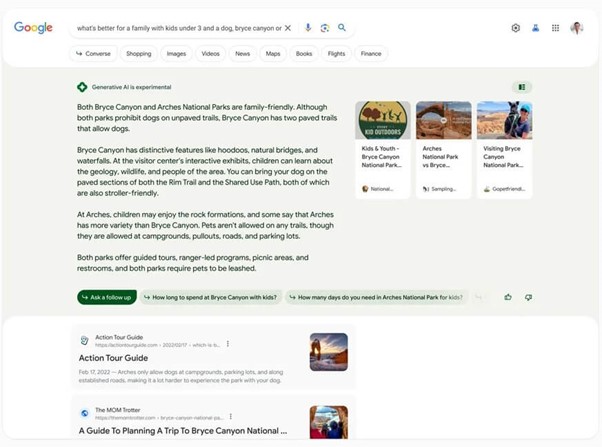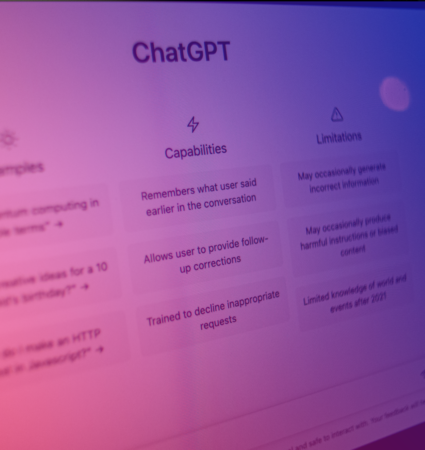What Google’s big AI announcements may mean for brands and search marketers.
Google held its I/O conference yesterday (10 May) and among the keynotes, there were two big announcements on the hot topic of AI, demonstrating how it plans to integrate the technology into what it is calling a Search Generative Experience (SGE). The key for brands is that the search user experience is about to dramatically change, with search becoming much more visual, more conversational and, arguably, more spontaneous.
Introducing search with generative AI
Back in February 2023 Google announced the development of BARD, an experimental conversational AI, as part of their “Project Magi” (AI-powered search engine). At this year’s I/O conference, Google built upon the early February announcement to demonstrate what the new incorporation of Bard in search engines results pages (SERPs) may look like for users.

What we saw was a search environment that was much more adept at responding to and answering complex, multi-clause queries that may ordinarily have been split up into a series of smaller individual searches. In one example, Google demonstrated a search query “what’s better for a family with kids under 3 and a dog, bryce canyon or arches” – a search that may have previously been a series of individual queries (for, “family friendly days out”, “dog friendly family days out” and “bryce canyon vs arches”).
In this example, the search result returned an AI-powered snapshot with key information to consider, with supportive links to “dig deeper” and the ability to ask “follow-up” questions, which opens a more conversational mode where the user will discuss the topic with an AI chatbot. What was striking in this latest demo was the prevalence of links in the result – something that we didn’t see when the product was demonstrated in February. This represents a new development for the concept and something for search marketers to consider.
Additionally, a new “Perspectives” tab will allow users to explore long-and short-form videos, images, and written posts others have shared on boards, Q&A sites, and social media platforms relating to that search, and Google will also show details about the creators of such content.
Below this, the more conventional organic results are shown.
Big implications for ecommerce
There were also big changes demonstrated for shopping-related searches, with the SGE receiving a much more immersive search experience where they can interact much more easily with the products they’re considering.
When completing a “shopping” search, users will receive a snapshot of noteworthy factors to consider, and a selection of products relevant to the search. These results will include product descriptions, reviews, ratings, prices and images, with users also able to ask for product comparisons, alternative products or complimenting products within the AI-generated snapshot. Shopping ads will also continue to appear in the dedicated ad slots within the generative AI snapshot.
Why does this matter?
There are two main impacts on the world of SEO in light of Google’s announcement to highlight; the changing experience within the search results, and the potential impact on click-through rates.
Changing SERP experiences
The introduction of natural language models in search will fundamentally change how users interact with search engines. The understanding of intent will become truly personalised and Google will move away from showing users what most people who search for something want or need and instead, more towards showing individuals what they most likely want and need based on previous searches, follow-ups and behaviour.
Whilst we cannot say for certain right now how exactly the generative AI will select which information from sites to pull into results, it does appear from the demo that organic listings will still be heavily prevalent and linked-to from the AI response. This creates a couple of likely scenarios in our view:
- Google search results may pull in the top three to five existing search results.
- We could see an even bigger emphasis on Google content quality E-E-A-T as Bard tries to pull the most trustworthy sources for its users.
The inclusion of the Perspectives tab will also increase visibility and engagement on content from social platforms (Tik Tok, LinkedIn, Instagram etc.) and Q&A sites (Quora, Google Answers etc.). This development highlights the importance of SEO not being considered simply as a siloed performance marketing channel, but rather a collaborative, multi-medium marketing experience channel.
Impact on organic click-through-rates
Again at this point, it is not clear how intensely this update will impact click-through rates (CTRs). What is clear, however, is that sites have already seen CTRs decline from an ever-diversified SERP featuring more ads, videos, and featured snippets.
It is likely that the amount of “zero-clicks searches” will increase with the introduction of generative AI results, as users interact with the SGE interface without entering a website.
That said, it is fundamentally in the interest of every search engine to drive traffic to other sites. Not only is it critical to their business models, it’s also a tenet of the unwritten code between search engines and the open web. As Microsoft CEO Saya Nadella put it: “Our bots are not going to be allowed to crawl search if we are not driving traffic.”
The announcement, and the prevalence of organic listings with links to websites that were included in the Google I/O demonstrations, appears to confirm the prediction made by Danny Blackburn, Reprise Chief Strategy Officer, back in April 2023:
“More likely, is that Google, Microsoft […] will find ways to balance in-search engagement and driving traffic”.
What this means for brands and digital marketers
Ultimately, we’re all striving to understand how AI-powered search engines will understand what a ‘good experience’ look like in a myriad of moments. We will continue to develop our SEO strategies and implementations to adapt with the ever-diversifying SERPs. We have noted a few key points below for SEOs to consider moving forward:
- Keyword Research
- Performance Tracking
- SEO Strategy
Keyword Research
The introduction of generative AI will incite more natural, long-tail queries vs. the traditional keywords or questions we see today.
As new tooling develops around AI chat usage in search, keyword research will not go away, but develop, like everything else. But what is clear is the importance of ensuring we are understanding customers, their pain points, and questions on our brand/topic areas. This will allow us to provide high quality content, addressing the questions (ever so detailed as they may be) of our website guests.
Performance Tracking
In the immediate future, generative AI is obviously not going to be present on all searches. But as it rolls out, we will be keeping a close eye on which keywords/queries it is appearing for. This will allow us to understand any changes in performance as this new interface rolls out.
SEOs, if they haven’t already, will need to be liaising cross-channel to ensure tight collaboration on performance tracking for social, PR, and other forms of content that will appear within the Perspectives tab.
In the future, we hope and expect to see generative AI search performance data added to tools like Google Search Console, and we’ll be leveraging our Reprise proprietary tooling for keyword tracking immediately.
SEO Strategy
As we look to understand the impact of the rollout of SGE, we will be proactive in developing our search strategy, aiming to provide users with the best organic experience possible, whilst ensuring we are identifying new opportunities within the changing SERP landscapes.
The inclusion of the Perspectives tab is another push for SEOs to ensure they are not taking a “blog-only” approach to their content strategy. Rather, SEOs will need to adapt their understanding and integration of a multi-channel content approach in order to secure visibility within these diverse search engine results pages.
A good way to put it: “In an AI-powered future, the brands that win won’t be the spammers and the manipulators, it will be the experimenters and the behavioural scientists. AI might be here, but search is becoming more human.”




